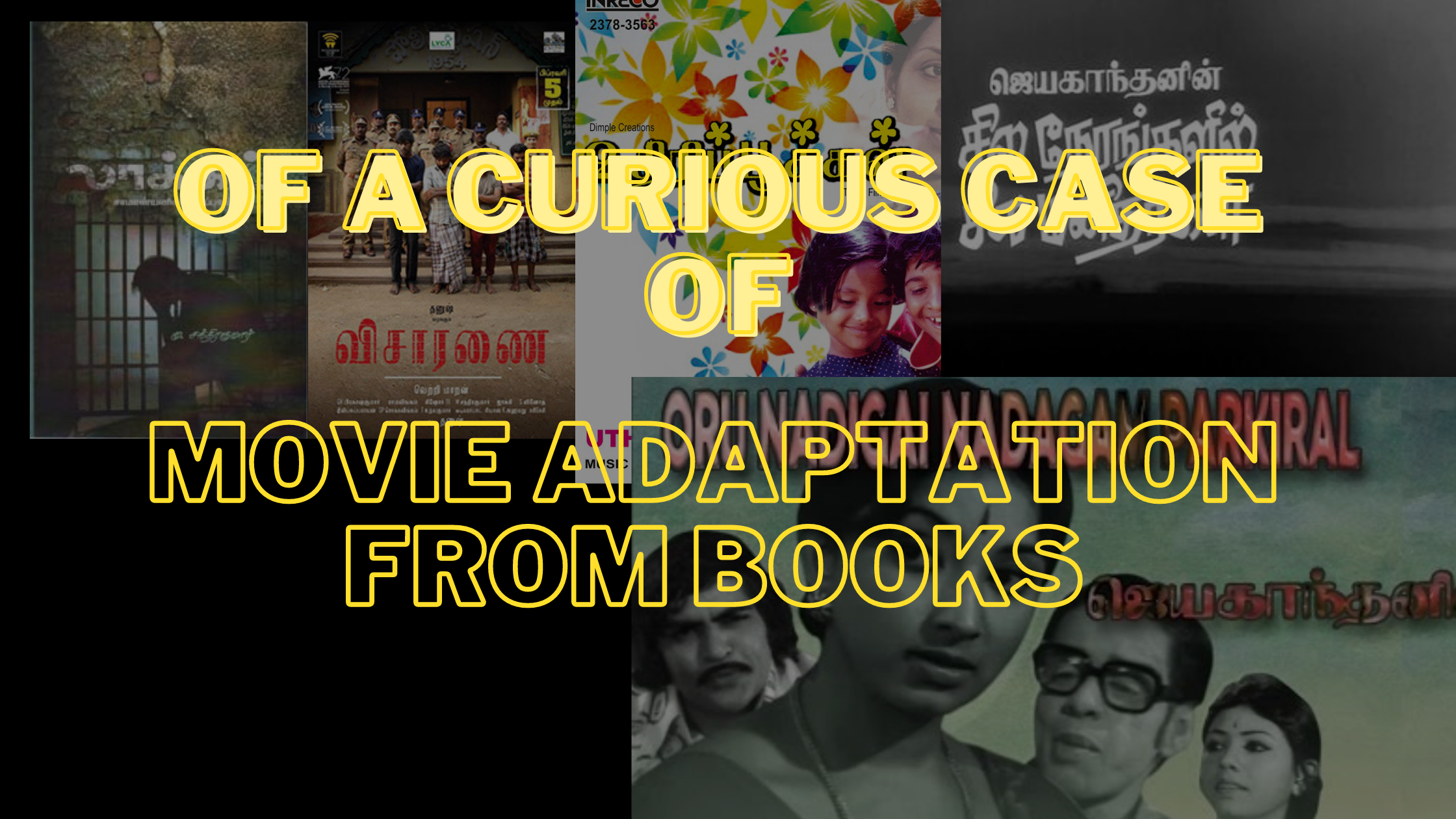
Of a Curious Case of Movie adaptation from Books
In this last post, on the Three-part blog series, we are going to discuss the movies adapted from books. It is not easy to adapt a book to a movie and at the same time doing it also has more benefits. let’s dive a little deeper into understanding this.
The first post in this series is Of a Curious Case of Remakes.
The second post in this series Of a Curious case of Big Budget Movies.
Note: I have a better understanding of the Tamil Film Industry more than any others, hence the opinions here will be based on Kollywood.
Some History:
Kollywood and many other Film Industries moved to the Silver Screen from the theatres, they have been the biggest form of art for a very long time. In Tamil Nadu street plays, villupaatu and puppetry were the primary forms of storytelling mediums, they relied on Mythology, local folklores and at times the story of kings who ruled the land were story sources.
Kollywood in its initial days saw plenty of Historical fiction and Mythological movies. Over a period, they transitioned into family dramas and occasional thriller movies.
Books and movies are storytelling mediums and it is natural that some movies adapted successful books. Book reading gives us a leeway of imagination, some embrace it and don’t want to give up on those imaginations dampened. But people like me who are movie fans would want to see how a good filmmaker would treat the book and give a fantastic movie out of it.
First Literary adaptation:
Since mythologies had their roots from the theatre and street play days, we can consider them as the first literary adaptations. In Tamil, Ramayanam (1932) was the first-ever movie adapted from a book produced by East India Film Company.
Later, there was Kovalan (1933), a character based on Silapathikaram, (One of the Five Great Tamil epics )and then came so many mythological movies in Tamil adapted from Short-stories, poems, and dubbed from other languages. But a book adaptation in Tamil came in 1936, written by S.S.Vasan who is the founder of the famous Tamil Weekly Ananda Vikatan. The movie is Sathileelavathi, directed by Ellis R. Dungan and had M.K. Radhakrishnan and M.R. Gnanambal in the lead roles.
Why adopt a literary source?
Literary sources provide ready-made stories and plot points for the directors and screenplay writers to work on. Does it mean the Directors lack story writing skills? Yes, a Director’s primary job is to direct i.e., Plan, communicate, run the ship without it sinking. Unfortunately, a director’s role isn’t the one you see on screen.
Book adaptations and Indian Directors
Our Indian directors take pride in showing that they can write Story, Screenplay, Dialogues, and Direction. Some directors even go to the lengths of composing Music, editing, and Cinematography. It is okay for a director to do everything until and unless the film he/she intend to take has reached the audience. This quality is one of the banes of Indian Cinema in itself, the directors attach these credentials to their egos and carry it everywhere.
Some directors who want to tell a story will first be a reader, Is it necessary to read before they tell a story? No, but books always open an avenue of imagination for anyone who reads. It not only widens their views but also their imagination and skills such as storytelling.
Polarizing opinions on adapting a book to a Movie:
Story-telling is an art, making a movie out of existing material is also an art. Adapting a book into a movie isn’t an easy task, in books the author doesn’t have a limitation to write but it isn’t the case in movies. There is a time limit and the audiences could only for so many hours in a closed hall.
So, the directors take some leverage in adding or removing scenes from the movie they see fit. Let’s take Visaranai as an example, directed by Vetrimaaran; which is an adaptation. Only the first half of the movie is from the book and the director added the second half which fits the narrative of the larger system. It did well and the book Lockup by Mu. Chandrakumar sold like hotcakes. We can also take the Lord of the Rings book series which Director Peter Jackson adapted into a three-part movie also received wide-spread appreciation from the readers. A director needs conviction and must understand the story, its theme, and politics more to adapt it.
Conclusion:
Directors like Mahendran, Balu Mahendra, K. Balachandar, and a few more made great Movie adaptations from books. They have also written their own stories. We call them auteurs of Tamil Cinema because their movies stand the test of time and aged well over years. Do, I call other directors bad? definitely not, but the point I’m trying to drive here is one must be a reader to be a better storyteller. It is okay to hire someone to write stories and they can Direct. They wouldn’t fare less, instead, their work gets mass appreciation.
Thus ends my three-part blog series and What do you think about this series? Do share your thoughts in the comments and let’s discuss more there.





-
-
2 years
Tagged DC, DC Animated Movies, DC Animated Universe, DC Comics, DCAMU